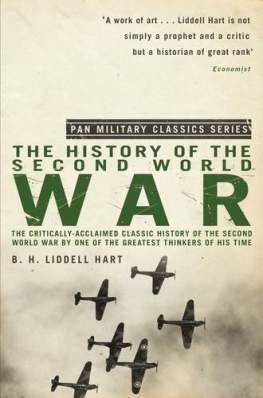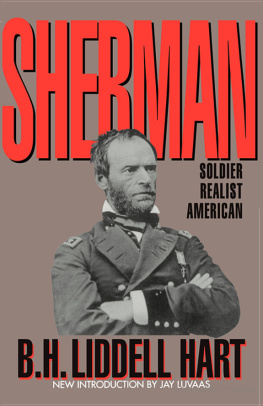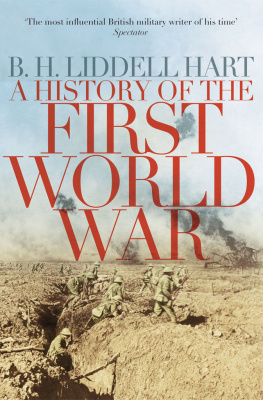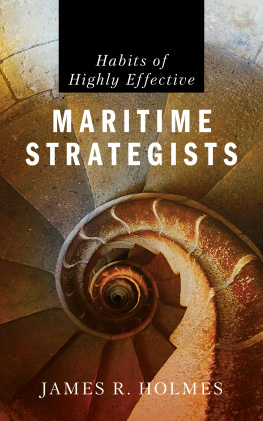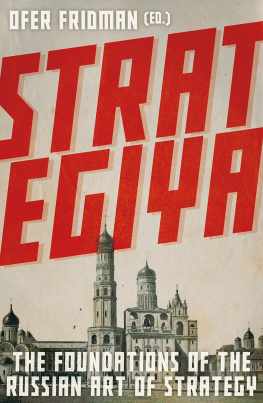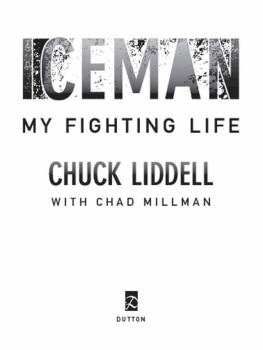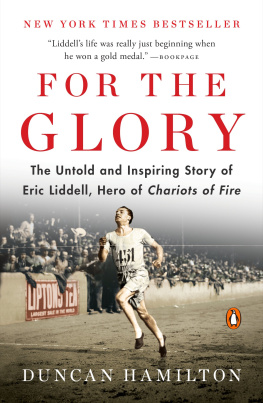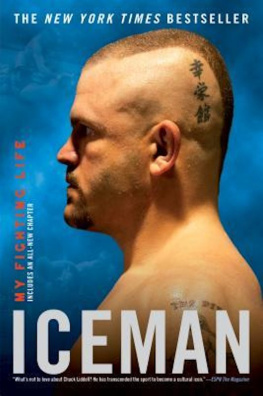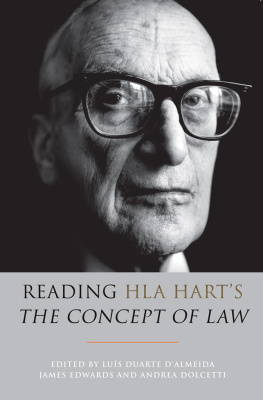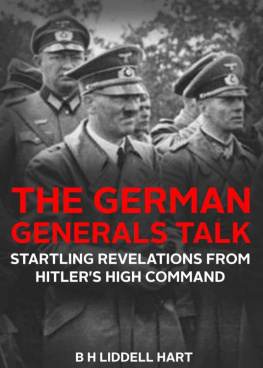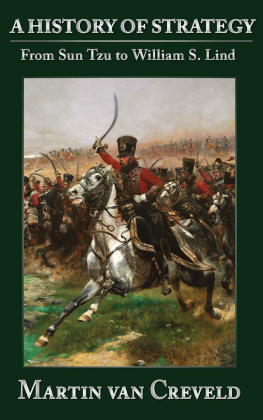Table of Contents
HISTORY OF THE SECOND WORLD WAR
B. H. Liddell Hart
G. P. Putnams Sons New York
Third Impression
FIRST AMERICAN EDITION 1971
Copyright 1970 by Lady Liddell Hart Maps copyright 1970 by Cassell & Company Ltd.
All rights reserved. This book, or parts thereof, may not be reproduced in any form without permission.
Library of Congress Catalog Card Number: 79-136796
Sir Basil Liddell Hart (1895-1970) was the greatest military thinker of the twentieth century whose ideas particularly on the role of mechanized warfare revolutionized the art of war. A student at Cambridge at the outbreak of World War I, he joined the army and rose to the rank of captain before he was gassed in 1916 in the Battle of the Somme. He retired from the army in 1927 to devote full time to writing. At various times in his career he was military correspondent for the Daily Telegraph, military correspondent and adviser on defence to the London Times, and military editor of the Encyclopaedia Britannica. He lectured at Cambridge University and served as personal adviser to War Minister Hore-Belisha in reorganization of the British Army before the outbreak of World War II. He was the author of more than thirty books which had enormous influence on shaping military thinking about mechanized warfare, particularly among the Germans, whose early successes in the war stemmed directly from techniques adopted from Liddell Harts teachings.
FOREWORD
by
Lady Liddell Hart
Some months ago, when I was asked by the publishers to write the Foreword to my husbands History of the Second World War, I very soon realised that to thank all those who have helped in its preparation, acknowledgements should properly be given to hundreds of people, from field-marshals to privates, professors, students, and friends, with whom Basil had had contact during his active, enquiring life. In the Foreword to his Memoirs, he wrote that Memoirs are, on their happiest side, a record of friendships and in these I have been very fortunate. This History has also benefited from such friendships.
As a small boy Basil developed a love of games and the tactics of games, and he kept records and newspaper cuttings about them, as he did about the early days of aviation, when pilots were his schoolboy heroes. This habit he kept throughout his life and for all his ever-widening interests, so that at the time of his death he left hundreds of thousands of cuttings, letters, memoranda, pamphlets and the like on subjects which ranged from armoured warfare to fashions in clothes. Later, in diary form, or what he called Talk Notes, he recorded discussions he had about subjects that especially interested him, as soon as possible after they had taken place.
His first post-war book was The Other Side of the Hill, the record of his talks with a number of the German Generals who were prisoners-of-war in England. Many had been readers of his pre-war books and were eager to discuss their campaigns with him. In December 1963, looking back, he wrote A note on why and how I wrote this book which explains why he attached so much value to this kind of record:
When exploring the events of the First World War, in the 1920s and 1930s, I came to realise how much history was handicapped because no independent and historically minded enquirer had been able to ascertain and record what the military chiefs were actually thinking at the time as a check on their subsequent recollections. For it became very evident that the memories of the participants in dramatic events are apt to become coloured or twisted in retrospect, and increasingly as the years pass. Moreover official documents often fail to reveal their real views and aims, while sometimes even drafted to conceal them. So during the Second World War, when visiting the British and Allied commanders, I made extensive notes for history of the discussions I had with them, recording particularly their current views as a supplement to the documentary records and a means of checking memories and accounts written in later years. At the end of the war I was given an early opportunity of interrogating the German commanders who were then prisoners-of-war, and had many long discussions with them about the operations in which they were concerned and about wider matters. While this investigation naturally could not be quite so contemporaneous, as a light on what they had been thinking before a particular event or decision, it came at any rate before memories had become hazy with the passage of time, while their accounts could be cross-checked with those of other witnesses, as well as by the documentary records.
Readers of this History will see from the footnote references to these talks how they have stood up to the test of the passing of time and to Basils continued cross-checking over the years.
Early in 1946 the Colonels-Commandant of the Royal Tank Regiment asked Basil to write the history of the Regiment and its predecessors, covering the two World Wars and the years between the wars. It was an immense task which took many years, and the book was not published by Cassell until 1958. But the research needed for The Tanks was a great help when Basil came to write this History, for he had come to know personally many of the younger commanders who had fought on both sides, while he had also had many long discussions with such old and valued friends as Field-Marshal Montgomery, Field-Marshal Alexander, and Field-Marshal Auchinleck, as well as his tank people and many of the German Generals on the other side of the hill.
After the 1946 War of Independence, Israeli officers of all ranks came to see Basil to consult him about the formation of their Army. Among them was Yigal Allon, who became a close friend and it was Yigal who inscribed his photograph in the library at States House with the now much-quoted words To the Captain who teaches Generals. In 1961 Basil was asked to visit Israel and lecture to the armed forces and universities. Many tributes have been paid to Basils teachings by the Israelis, and Basil often said, somewhat ruefully, that rather than his own countrymen, the Germans and the Israelis were his best pupils.
In 1951 Frau Rommel asked him if he would edit her husbands papers. He agreed and a warm relationship developed between us and Field-Marshal Rommels widow, his son Manfred, and with General Bayerlein, who had been Rommels Chief of Staff; and also with Mark Bonham Carter of Collins, who was the very able publishers editor.
In 1952 Basil lectured at War Colleges in Canada and the United States. These were exhausting months, but rewarding, and he was able to meet wartime friends from both countries and to make new ones. Among the honours he received that gave him most pleasure was his honorary membership of the U.S. Marine Corps, and until he died he daily wore the gold tie clip presented to him on that occasion.
In 1965 he was asked to be Visiting Professor of History at the University of California, Davis: so at the age of seventy he became a Professor and lectured and taught on the two World Wars. This was a stimulating experience which he thoroughly enjoyed, but unfortunately our stay was cut short by several months as he had to return to England for a major operation. At the time of his death he was looking forward against his doctors advice to returning to America in April 1970 at the invitation of the U.S. Naval War College to give a series of lectures on strategy.
Travel was an essential part of Basils life, and he accepted many invitations to visit European countries and to lecture at Staff Colleges. He was a brilliant map reader and his vivid accounts of Shermans battles in the American Civil War were written with the aid of an intensive study of large-scale maps, long before he visited the battlefields of the Southern States. After the last war we made almost yearly visits to Western Europe to study battlefields and landing beaches, to visit old friends, and, maps in hand, to check data for this History. He loved beautiful country, cathedrals, and good food, so for our tours the Guide Michelin , battlefield maps and tourists guides were always put in the car together, and careful daily notes about terrain, food, and church architecture were dictated to me for subsequent filing in the ever-growing records at home.
Next page
